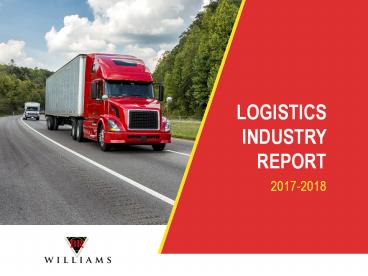Logistics Industry Report 2017-2018 | BR Williams Trucking - PowerPoint PPT Presentation
Title:
Logistics Industry Report 2017-2018 | BR Williams Trucking
Description:
A Trucking Company Logistics Industry Report 2017-2018 including current trends, laws & regulations, technology, turnover rates, capacity utilization & future recommendations. – PowerPoint PPT presentation
Number of Views:403
Updated: 14 March 2018
Slides: 13
Provided by:
brwilliamsmarketing
Category:
Products & Services
Tags:
Title: Logistics Industry Report 2017-2018 | BR Williams Trucking
1
LOGISTICS INDUSTRY REPORT
2017-2018
2
I have traveled some in the last year to national
meetings discussing various transportation and
economic content. As a result, I have become
increasingly focused on what is developing in the
supply chain and trucking industry, across the
nation. Personally, I have been in trucking for
some 34 years. Entering into the industry shortly
after it was deregulated in 1980, I saw dramatic
change in the following five years. Since then,
three monumental events have taken place, in
1994, 2003, and most recently in 2014. To
veterans in the industry, conditions are forming
today that feel very similar to 1994. This write
up will address these conditions and implications.
A PREFACE FROM OUR CEO
Greg Brown, CEO
3
TRUCK DRIVER SHORTAGE
2015
TODAY
Driver shortage skyrocketed. 45,000 drivers
needed in the truckload sector
Driver shortages expected to increase to an
unprecedented 50,000 drivers needed
2016
Freight volumes softened. 36,000 truck drivers
needed.
4
FACTORS AFFECTING DRIVER SHORTAGE
Demographics
Lifestyles
Job Alternatives
Technology
Laws Regulations
High Turnover Rates
5
DEMOGRAPHICS
Age
- Median age of over-the-road (OTR) driver is 49
- Average American worker ager is 42
- Current driving force aging and retiring is
higher than that of incoming drivers - Minimum age is 21
Gender
- Women make up 47 of work force
- Only 6 of drivers are women, which restricts job
growth
6
FACTORS AFFECTING DRIVER SHORTAGE
Lifestyles
Job Alternatives
Technology
- Older drivers slow down and retire. Young, often
newly married, drivers assigned to longer less
popular routes. Young career makers move to
regional or local driving positions once they
gain experience.
- As recession ended and unemployment rate
decreased, other job opportunities opened for
people, such as construction which is more local,
has less responsibility, and fewer regulatory
guidelines
- Future technology that will help industry will
not be available for a number of years. Truck
Platooning and Smart or Autonomous Trucks are
currently in development and testing phases.
7
LAWS REGULATIONS
ELD Mandate
The ELD mandate is a regulation effective
December 18, 2017, that requires all for-hire and
private trucking fleets to have switched from
paper logs to ELDs (Electronic Logging
Devices). The American Trucking Association
estimates that there are 3.5 million truck
drivers in the U.S. and upwards of 1 million
trucks without the required devices.
8
HIGH TURNOVER RATEs
2017 90
Turnover rates in the for-hire truckload sector
have soared since the economic recovery of 2008,
experiencing at least 90 turnover between 2012
and 2015. While the turnover rate dropped to 81
in 2016, as freight volumes softened, current
2017 data indicates the turnover rate for this
year will again exceed 90, due to industry
churn.
2016 81
Turnover Rate
2015 90
9
CURRENT INDUSTRY TRENDS
As a result of these and other factors, truck
capacity is becoming increasingly difficult to
source, spot market rates are sky-rocketing,
service failures are mounting and shippers are
feeling the pinch. Some shippers with dedicated
capacity and contract rates are protected from
this instability. However, contract rates, in the
long term, tend to follow spot market rates.
10
CAPACITY UTILIZATION
in the Trucking Industry
Capacity utilization has increased from 90 in
2000 to approximately 98 in 2017. Truck tonnage
can increase or decrease rapidly, but it takes
time for trucks, trailers and drivers to be added
to the market to accommodate increases in demand.
Without the spare capacity represented in
capacity under-utilization, any significant
increase in demand will cause trucking company
shortages.
Capacity Utilization and the ELD Mandate
Capacity is a truck, trailer, and a driver with
legal hours to drive and the ELD has effectively
removed capacity from the marketplace. The
reduced capacity increases pressure on trucking
company rates, the carrier loses driver
productivity, and the drivers take home less
money. The carriers must then reciprocate the
drivers lost wages, as well as their own lost
productivity yield.
11
FUTURE OF THE INDUSTRY
With the large number retiring drivers and slow
growth of entry-level candidates in search of a
trucking company job, the driver shortage is
expected to increase again in 2018 to over 63,000
needed drivers. If the trucking industry
experiences no change or new regulation, the
trend line is expected to continue at the same
pace, resulting in a shortfall of 175,000 drivers
in 2026 or before.
12
CONCLUSION
- Here are a few recommendations when preparing for
2018 - Find ways to provide more advance notice.
- Avoid expedites like the plague.
- Ask how your 3PL sources capacity and the
characteristics of their typical carrier. - Lock in capacity and contract rates for 2018 with
a preference for asset-based carriers. - While a transitional market period is painful for
the entire shipping community, shippers have a
dedicated friend and partner in BR Williams, a
logistics and trucking company. For help better
managing a supply chain, dependable information
about the trucking industry, or assistance, reach
out to BR Williams.































